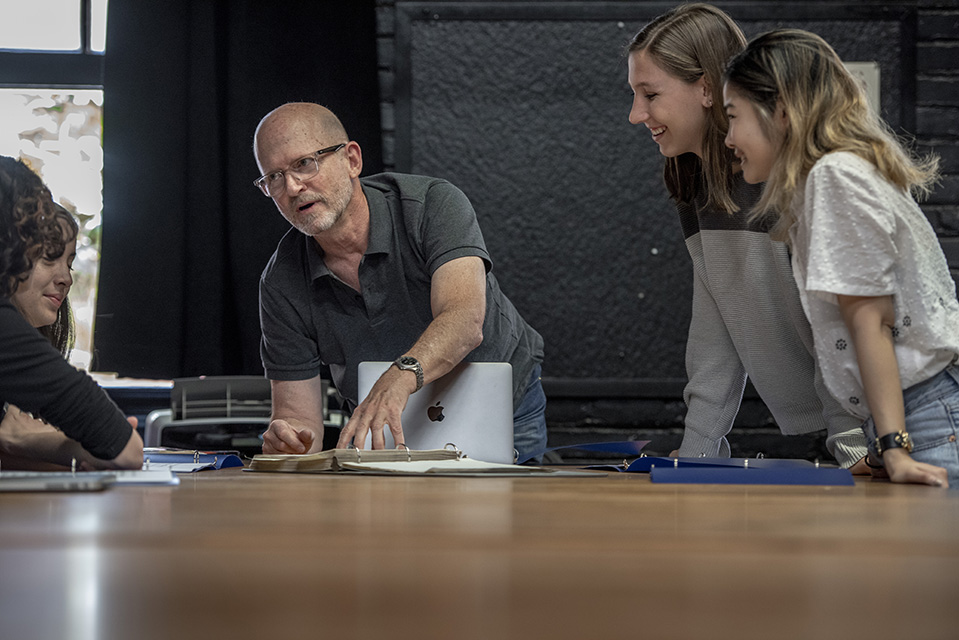SDA professor transmits professional lessons to students

At USC, students boast the opportunity to learn from working professionals in their field of study. This is no exception at the School of Dramatic Arts, where Scott Faris, director of the school’s upcoming play “The Cider House Rules,” teaches.
Faris, a Southern California native, began his career as an actor before transitioning into directing. He attended a performing arts university in San Diego where he appeared in several productions. He eventually earned his equity card and moved to New York City after graduation. Although he arrived in what he called the “big leagues,” he said he still wanted to do more.
“I looked around the room in rehearsal and while we were on tour and said, ‘Who’s in charge here?’” Faris said. “And I realized that it was the production stage manager.”
This realization prompted Faris to dive deeper into the world of stage managing, and eventually, directing.
“I followed that path and never looked back,” Farris said.
In addition to his work on Broadway, Faris has assisted with several spectacle shows, most notably Cirque Du Soleil, to bring in aspects of acting and marry the two worlds together.
Today, Faris is an assistant professor of theater practice in stage management and director for SDA’s upcoming production, “The Cider House Rules.” The show is performed in two parts over the course of two different nights, spanning decades of the characters’ lives. The cast will perform in both parts of the play, which allows for not only consistency in the narrative, but also growth and exposure to new techniques of acting.
“I think it is a tremendous opportunity for actors to be able to play characters that mature in front of the audience’s eyes,” Faris said. “There are challenges that go with that, but I think it’s a great opportunity to explore how you would do that.”
Directing a play of this size is challenging, but Faris remains optimistic.
“You can’t start every rehearsal with ‘This is a huge show. I hope you make it,’” Faris said. “You say, ‘Good, let’s start here. And let’s just do this and only think about that.’ And when we feel good about that then we will move onto the next step. So it therefore doesn’t become this daunting mountain to climb, but it really becomes a path that you are looking for each step-creating stone along the way.”
Faris has seen differences between directing in professional and university settings. To him, the more experiences he confronts, whether that be working for a professional group or a school, the more he learns. One of the differences, he said, is that SDA students possess the same passion and enthusiasm as working professionals, but don’t have the same connections. Faris said he strives to be their guide into the professional theater world.
“It’s fantastic to be able to try to share with [the students] the way I work,” Faris said. “Not so much the expectations of professional theater, but the methods and the goals. I’m very much aware of guiding them as a learning experience at the same time as directing this show.”
Additionally, it is a challenge to compete with other shows that are put up at the same time. But Faris uses that as a way to really explore the actors he is auditioning.
“It intensified how I explored the skills of each actor that came in front of me,” Faris said. “I wanted to make sure I’d explored each person as fully as possible, make sure I wasn’t, that I wouldn’t underestimate or miss some quality they had. You feel that pressure making sure that you don’t let anyone get away that you want.”
When asked what the main takeaway from the show should be, Faris said he is not there to tell the audience how to feel about this work but rather to present the story and provide a platform for student artists to collaborate and grow.
“My responsibility is to present the play as clearly and fully as I can so that everyone can draw their own conclusion when they walk out,” Faris said. “I’m not there to tell them that, I’m there to present.”
“The Cider House Rules, Part One: Here in St. Clouds” opens Oct. 31 and “The Cider House Rules, Part Two: In Other Parts of This World” opens Nov. 1 in the Bing Theatre.

